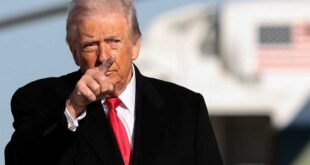Calling President Biden a Cold War “warrior,” Chinese IR experts, by citing Pelosi’s visit to Taiwan last August and the recent US decision to impose new export controls aimed at crippling China’s ability to procure or manufacture advanced semiconductors are claiming that the US is preparing to wage a war on China. With the first anniversary of Europe’s first war since WWII approaching, the US-NATO have extended their unconditional support to Ukraine aimed at prolonging the proxy war against Moscow. And now, the US has opened a new front in its vilification campaign against Iran, by accusing Tehran of becoming an accomplice of Russian “aggression” and “genocide” in Ukraine.
These are dangerous times in US-China relations. Since taking the oath, President Biden has been firmly holding on to the idea of not letting “China surpass the US” as the global leader. China, as Xi Jinping has repeatedly reiterated, in reaction to President Biden relentlessly playing the provocative Taiwan card, is singularly focused on realizing the “China Dream” of reunification with Taiwan. At the same time, Washington’s concerns are only rising as China is doggedly pursuing its goal to wrest global economic, if not military, leadership from the US. Additionally, since winning a third 5-year term, President Xi is advocating an ultra-nationalist party line of leading his country to take up its “due place in the world.”
At another level, the idea that the US is gearing up for a multi-front war against Russia, China, and Iran, is becoming (unbelievingly) acceptable and (disturbingly) normal in the mainstream military and political discourse in the US and in the West. Not long ago, while admitting that sooner than later we will likely see the world convulsed by war from Europe to the Pacific, an op-ed in Bloomberg observed, “the idea isn’t as absurd as you may think.” Expounding on the reason, the write-up further claimed, “Not in decades has the US faced such prospects of near-term military confrontation in several separate theatres.”
Last February, just a week before Russia launched the war on Ukraine, Foreign Policy, an American news publication that was founded over half a century ago to give voice to alternative views about the US foreign policy during the Vietnam War, published an article by Mathew Kroenig, an influential IR professor, appealing to Washington to prepare for war with both Russia and China. “The United States remains the world’s leading power with global interests, Washington and its allies should develop a defense strategy capable of deterring, and if necessary, defeating Russia and China at the same time,” Kroenig wrote.
Furthermore, the visit to Taiwan by the third top leader in the US political hierarchy last August was the first by such a high-ranking US official since 1979 – the year Washington established normal diplomatic relations with China on the written commitment that “one China policy” was the foundational principle for Washington-Beijing bilateral ties. The visit was also the first violation of the “one China policy” principle by such a high-level US official in 43 years. And, the visit no doubt had brought the world on edge and pushed the US and China on the verge of a catastrophic war. Just before her visit, the vibrant Chinese social media was abuzz with questions such as why the US Speaker’s Taiwan visit was drawing more international media attention than the raging US-NATO proxy war against Russia in Europe.
Not surprisingly, the White House had disdainfully dismissed repeated warnings issued by Beijing that the Pelosi visit will be viewed in China as tantamount to the US effectively recognizing Taiwan’s independence, meaning crossing China’s core “redline.” In what is described as an absurd claim, White House spokesperson John Kirby said the trip changed “nothing” about US relations with China. However, Elbridge Colby, who served in the US Department of Defense under Trump and was the principal author of the 2018 National Defense Strategy, the document which laid out the geopolitical motivation for going to war with China, said in a Tweet on the day Pelosi flew into Taipei that a conflict with China “makes sense for Americans’ concrete economic interests.”
True, President Biden took the US out of Afghanistan and put an end to the desultory “forever war.” But viewed in the context of the post-WW2 history of US militarism, many dismiss it as an aberration. Last fall, an influential Washington think tank observed, “having dumped one small war, good Ol’ Uncle Joe appears ready to start three big ones.” Currently, the US-NATO war against Russia is raging on; [the US] war against Iran is now imminent with Tehran claiming it is technically ready to make n-bomb; and, Nancy Pelosi just disappointed the Blob – as the foreign policy establishment in the US is called, by failing to “bait” Beijing into using force against Taiwan.
Let us face the truth. Following the US war on terror strategy since “9.11,” no US president has succeeded in reducing military expenditure. What is also true is no US presidential candidate won the election on the promise that s/he would cut defense spending. Why is that so? “Objectively,” in the words of an analyst, “[Post-‘9.11’] there was a ruling class consensus that increased spending on military and militarism was going to be a central component of US global policies going forward.” Some say, however, that the win of Donald Trump in November 2016 was an exception. Though candidate Trump promised his supporters that he would end the US’s “endless wars” if elected. But when he exited the White House after four years, the US defense budget he submitted for approval in Congress was the highest post-war military budget at $740.5 billion.
John Menadue, the former Australian ambassador to Japan, recently observed that the United States is “our most dangerous ally.” Typically, the US corporate media neither sought an explanation nor asked the ruling establishment why the House Speaker was dispatched to Taipei. As it were, spurred on by Moscow’s “stunning” performance in the Ukraine war, the Pentagon strategy is to somehow goad Beijing into using force against Taiwan. This will enable Biden to realize his two-front war strategy. Add to this a war on cards against Iran and you get a perfect recipe to fulfill the US ruling establishment’s penchant for military activism. American war historian Andrew J. Bacevich reminds us in his recent essay: “Republicans and Democrats disagree today on many issues, but they are united in their resolve that the United States must remain the world’s greatest military power.”
It is pertinent to recall a recent article in the Washington-based news magazine The Hill, invoking what Halford John Mackinder had warned the West a century ago. By emphasizing the importance of the Holy Land to Great Britain for the control of the Suez Canal, Mackinder is believed to have written: “Building railways across Siberia could allow a land power, alone or in alliance, to mobilize resources across Eurasia and challenge the hegemony of maritime power.” In their self-proclaimed role of the savior of the West, the two authors of the above-mentioned article warned: “Two world wars and the Cold War were waged to keep the powers that threatened to dominate what Mackinder termed ‘the Heartland’ from dominating the nation-states of the Eurasian littoral.”
Finally, it is important to remember neither the communist party-ruled China overnight turned into a challenger to the US-led international order nor did Russia nor Iran suddenly become pariah states. In the National Security Strategy 2022 document, the US declared both Russia and China as serious threats to the United States. A similar claim was made in the NSS October 2017 paper which too declared China as a hostile existential threat and a China-Russia-Iran alliance as a geopolitical threat to American interests. Today, Biden is far more determined and committed than all his twenty-first-century predecessors to restore and revive the US primacy. Citing Biden adviser Charles Kupchan’s latest book, Isolationism, which calls for the US to continue to seek primacy in order to reclaim its “exceptionalist mantle,” a security affairs analyst recently observed: “Failure to acknowledge that the world will no longer tolerate one single superpower has led the United States to impose a warlike situation.”
 Geostrategic Media Political Commentary, Analysis, Security, Defense
Geostrategic Media Political Commentary, Analysis, Security, Defense





